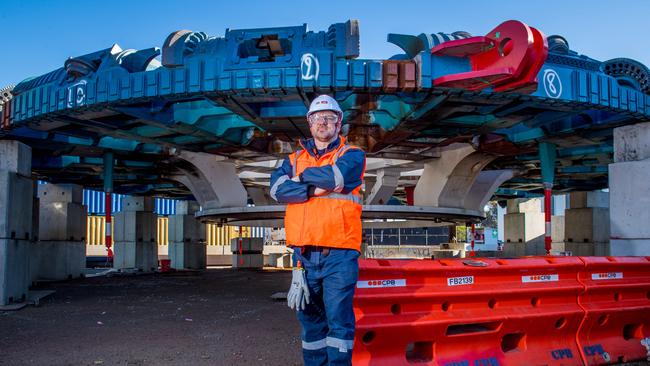Workers set to be laid off as contamination issue impacts West Gate Tunnel
Up to 200 workers are set to be dropped from the West Gate Tunnel project after months of complications, triggering a standoff between the State Government and Transurban and putting the completion of the project in jeopardy.
Scores of workers are set to be laid off from the West Gate Tunnel project after months of complications sparked by contaminated soil at the site.
Union delegates have met with the consortium running the project this morning and have been told as many as 150 staff may not be working on the site from January 24.
Digging is yet to start on the tunnel amid a dispute over how to deal with toxic soil with traces of asbestos and industrial chemical PFAS.
Staff were also told 24-hour operations would be altered into an 8-hour roster into the near future, according to sources close to the project.
Most of the workers likely to be sent home are understood to be tunnellers needed for the digging operation.
Tunnelling delays have meant the construction of tunnel boring machines was deliberately slowed to extend the timeline and give workers something to do, with some allocated to other parts of the project.
Some staff may could be moved on to other projects or rehired at a later date.

Transport Infrastructure Minister Jacinta Allan said it was an “incredibly disappointing decision” by the joint venture.
“We expect that Transurban and its builder will make every effort to keep these workers on the West Gate Tunnel Project or redeploy them to one of the many other projects that CPB and John Holland are currently working on,” she said.
“The Government has a contract with Transurban to deliver the West Gate Tunnel Project by 2022, and our expectation is that will be met.”
Workers attending the meeting were told the decision was triggered by a standoff between the state government and Transurban, which has been contracted to deliver the project, about the handling of contaminated soil at the project site.
Soil contamination issues at industrial areas in Melbourne’s inner west had forced the start of major tunnelling work to be delayed by at least six months.
AWU state secretary Ben Davis said the delay would put the project’s 2022 completion date in jeopardy.
“It is terrible that AWU members on the project are being used as cannon fodder in the commercial dispute,” he said.
“When companies get into a blue with clients, construction workers are paying the price with jobs.
“As we saw (these tactics) with the Metro Tunnel before Christmas, so now we are seeing with the West Gate Tunnel after Christmas.”
Mr Davis said tunnelers had been told they were not needed because digging could not start until the company found a place to dump contaminated soil.
“In my view they should just start tunneling,” he said.
“There are lots of places that can accept the spoil they find ... It is just sabre rattling.”
While work was expected to start in July last year, the Herald Sun reported in November that it was likely to be delayed until at least February this year.
MORE NEWS:
QUESTIONS RAISED OVER TRANSURBAN’S WEST GATE TUNNEL BID
UNION ON ATTACK OVER WEST GATE TUNNEL’S TOXIC SOIL
WEST GATE TUNNEL BUILDER MAY COP FINE FOR FOREIGN STEEL
That had fuelled fears the project would not be delivered before the state election, a deadline Transurban is required to meet under the terms of the contract with the state government.
The presence of industrial chemical PFAS, as well as asbestos, has limited the number of tips which soil from the site can be taken to, and the construction consortium had ended up agreeing to expensive “bulk excavation” of earth at problem sites.
The Herald Sun has also been told that the consortium building the project was likely to make a claim for cost overruns which could total as much as $1 billion.
More than 4000 people are working on the project.
WorkSafe and the Environment Protection Authority have been called in to help handle the soil contamination issue.
